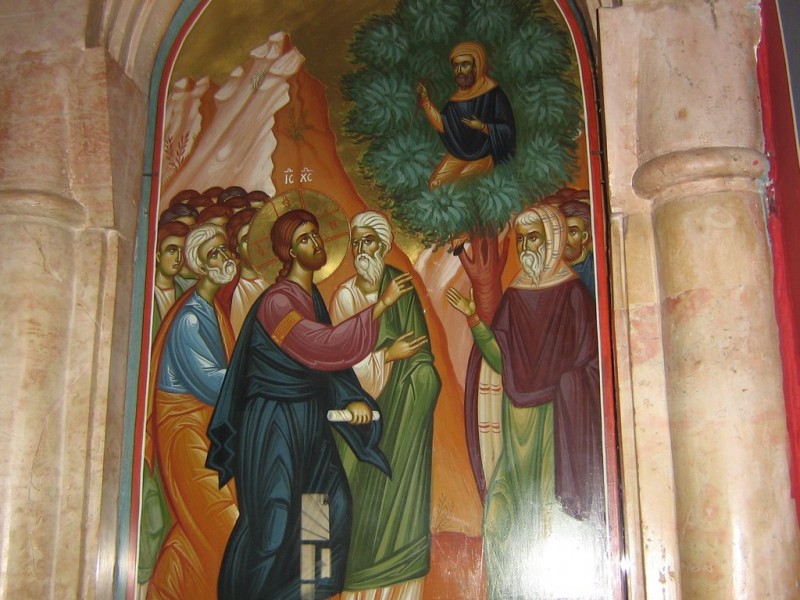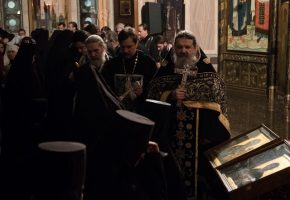In the name of the Father, and of the Son, and of the Holy Spirit. Amen.
Once again, we come to a very unique/special time of year. It is .a time to make a new beginning, to redouble our efforts to climb up the narrow and difficult path that leads to the kingdom of heaven. It is a time to renew our commitment to Christ, not only in word, but through our deeds. It is today, on the Sunday before the beginning of the Lenten Triodion, a mere four weeks away from the beginning of Great and Holy Fast, that we commemorate the repentance of a chief tax collector, the Holy Apostle Zacchaeus, who also is commemorated on April 20th.
Zacchaeus Sunday is at the very beginning of our preparation for Great Lent. Why?
Simply because we must begin our journey with the most basic premise of spiritual life: the desire to see Christ. It is this desire to see Christ that is at the forefront of real spiritual change, a change within our hearts that we ourselves are powerless to effect. It is the fathomless depth of the sight of Christ in His Glory that has empowered all of the aints from the Prophets to St. Paul the Apostle to our modern St. Silouan and Fr. Sophrony. It is this encounter with Christ, the Incarnate God, that inspired so many to forsake all the things of this world as if they were refuse, and enabled them to endure all things in their desire to be with Christ, the pearl of great price.
The rich, formerly corrupt business man, Zacchaeus, in his desire to behold and see Christ, climbed a tall sycamore tree (which is one of the tallest kinds of trees in that area.) He undoubtly was in his fine business clothing, and thus caused quite a spectacle, heaping upon himself quite a bit of shame and humiliation in the process. And yet, it was precisely this willingness to endure shame and humiliation for the sake of Christ that attracted the Lord’s attention and put him in the way of the Lord. This encounter with Christ enacted a change within Zacchaeus’ heart that caused him to gladly restore all the riches that he had taken/stolen.
If we ourselves desire to have a change in our lives, from a self-centered one to Christcentered one, and to change from the slavery of sin and death to that of vecoming true, shining, servants of God, we must constantly ask ourselves: Do we desire to see Christ? Do we really want to see and be with the Risen Lord at the end of Lent, on that Great and Glorious day of Pascha? (It is not by mistake that on the night of Pascha, and indeed, every Sunday we sing “Having BEHELD the Resurrection Christ, or some translations, because we have beheld.)” If we really are serious about seeing Christ, whether its fulfillment is found in this world or the next, we must also expect and be willing to suffer the shame, humiliation, and temptation that will inevitably follow it which is the way of the Cross, the way of Christ. The Book of Sirach in the Old Testament tells each of us plainly that “if you come forward to serve
the Lord, prepare yourself for temptation…For as gold is tested in the fire, so acceptable servants of God are tested in the furnace of humiliation.” [1]
During this Lent and Pascha, if we desire to behold and encounter the Living and Risen Christ, we must first become like the Apostle Zacchaeus in his repentance in three basic ways. First, if we long to be with Christ, we must ascend our own tree of humiliation which is an image of the Cross working in our own lives. We must no longer have a common, everyday earthly standpoint (on the ground) but like Zacchaeus we must ascend higher to a different vantage point. We can accomplish this in many ways: forcing ourselves in prayer (or extra prayers and prostrations), by keeping the fast (indeed, skipping a meal has the power to change the way we view the world) and also by going to confession. In fact, when was the last time we thought about making a completely honest and open lifetime confession? Do we realize that this is the most freeing and potentially life changing action that we have within our close and immediate grasp right now? We cannot maintain “a day in and day out,” “same old same old thing” perspective if we wish to see and be with Christ. Effort (and a lot of it) is required in any field of study. Why would it not be even more so in the science of sciences, the spiritual life?
Secondly, we like Zacchaeus must come out of the crowd and take time to seek the
Lord. We cannot find Christ, like Zacchaeus shows us, in the clamor and distraction of the crowds. Amusement parks, restaurants, parades, dances, and yes, even T.V. & radio, while not necessarily bad in and of themselves, are not the places where we can meet God. We must make time every day to be quiet and alone with the Lord, whether we are married or single. It is during this time which we can ascend our own Tree, which is the Cross of Prayer; for without prayer, it has been said by the Fathers, that there is no real communion with God. Certainly, we may have a lot of nice warm religious thoughts, but the real encounter with Christ comes through the difficult and yet rewarding work of prayer, the kind of prayer that is cry from the depths of the heart for forgiveness, healing, life, and salvation. Prayer is a fountain of living water that rejuvenates us, granting strength and enabling us to deal with our daily lives in a godly way.
Third and finally, we must not make excuses for our mistakes, our sins, and our past, but we must do all that is in our power to work a change in our lives through actual deeds. We must take responsibility for everything, whether it is our fault or not (in imitation of Christ who took upon Himself the sins and failings of the entire world.) Zacchaeus, after seeing Christ, was totally changed. The Lord called him and said “I must come and be with you today.” Zacchaeus in response did not make excuses to Christ, explaining why he done what he did, or how he was badly treated in childhood by his parents or how he fell into the wrong crowd as a young adult. No, without any excuse, he simply changed his ways, and restored that which he had taken. Instead of wasting time thinking about excuses and reasons and why’s and how’s, he simply acted and made the wrong right.
The Patristic way to peace begins with finding the fault in ourselves rather than in others. We might argue and say we most of the time we are certainly NOT to blame and sometimes this may be true. However, this self-accusation/blame of which we speak is not a negative, paralyzing worldly blame but rather it is a bearing of others burdens (which is a commandment of the Lord which brings us grace), it is a clear vision that we are not blameless, (as the saying goes, it takes two to tango) and that we have caused offense, whether now or in the past. It is this self-accusation that brings us change and peace rather than causing us to mope and grope. This kind of self-accusation is positive and it is realistic because really, when we think about it, who is perfect, without sin or blame?
Abba Dorotheos tells us that the reason we don’t make any spiritual progress is because “We remain all the time against one another, grinding one another down. Each considers himself right and excuses himself. All the while we keep none of the commandments and yet [we] expect our neighbor to keep every last one. Instead of [looking to] God who grants us these occasions to purify us from our sins we run after our neighbor crying ‘why did you say this to me? Why did you do this to me?’ This is why we don’t acquire the habit of virtue or make progress in the spiritual life…[for we are] unaware that everything happens by the foreknowledge of God for the benefit of each of us….Everywhere we find that the Fathers keep to this rule relating all things to God…and they found peace.” [2]
Zacchaeus’ conversion offers us a great hope. Even though he was considered one of the greatest of sinners, Christ the Lord received his good intention, showing him great compassion and wrought within his heart a change that granted him to become an Holy Apostle. Zacchaeus’ good intention was followed by decisive action that restored and corrected what he had done wrong in his life. The foundation of it all was and is the vision of Christ, our desire to see Him and be with Him in this world and the next, which initiates and brings to fruition all of our good works. Today, we must desire with all of our heart to see the Living and Risen Lord Jesus Christ in order to find the strength to change our lives. Let us therefore ascend our tree of humiliation through confessing our darkest sins in order to be granted a life changing shame that transfigures our souls. Let us climb up our own Tree alone: the Cross of prayer and when we find sight of Christ through this, let us be willing to descend from there in obedience to the Lord, going down, humbling ourselves and patiently enduring the temptations and humiliations that befall us. Let us flee the crowds and come to Christ, beginning this time of preparation with joy, knowing that our mourning will lead to gladness, and that our fasting is the preparation for our feasting of heavenly delight/divine grace. Let us endure the Cross of the coming Fast so that we might, on that great and Glorious day of the Pascha of our Lord, God and Savior Jesus Christ, be able to proclaim through our own death to sin and self and our subsequent Resurrection that Christ is our Life, our sure hope, our Resurrection, and the God and Savior of all who works in us, granting us the change of heart that brings eternal salvation. Amen.
[1] Sirach Chp. 2
[2] Abba Dorotheos. Discourses and Sayings. pg. 145-148. Paraphrase or slightly re-worded in some parts for clarity.
Source: The Monastery of St. Tikhon of Zadonsk
You might also like:
Sermon on the Sunday of Zacchaeus by Priest Theodore Liudogovsky
Why Do We Prepare for Great Lent? Isn’t Lent Enough?




















